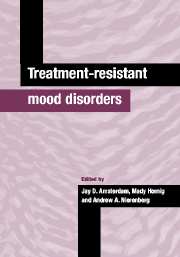Book contents
- Frontmatter
- Contents
- List of contributors
- Preface
- Part I The clinical problem
- Part II Biological basis
- Part III Treatment approaches
- 8 Selective serotonin reuptake inhibitors and serotonin–norepinephrine reuptake inhibitors in treatment-resistant depression
- 9 Conventional and second generation monoamine oxidase inhibitors in treatment-resistant depression
- 10 Drug combination strategies
- 11 Electroconvulsive therapy in medication-resistant depression
- 12 Thyroid augmentation
- 13 Cognitive therapy and psychosocial interventions in chronic and treatmentresistant mood disorders
- Part IV Special patient populations
- Part V Economic and ethical issues
- Index
- Plate Section
9 - Conventional and second generation monoamine oxidase inhibitors in treatment-resistant depression
from Part III - Treatment approaches
Published online by Cambridge University Press: 25 March 2010
- Frontmatter
- Contents
- List of contributors
- Preface
- Part I The clinical problem
- Part II Biological basis
- Part III Treatment approaches
- 8 Selective serotonin reuptake inhibitors and serotonin–norepinephrine reuptake inhibitors in treatment-resistant depression
- 9 Conventional and second generation monoamine oxidase inhibitors in treatment-resistant depression
- 10 Drug combination strategies
- 11 Electroconvulsive therapy in medication-resistant depression
- 12 Thyroid augmentation
- 13 Cognitive therapy and psychosocial interventions in chronic and treatmentresistant mood disorders
- Part IV Special patient populations
- Part V Economic and ethical issues
- Index
- Plate Section
Summary
Introduction
The treatment of patients with treatment-resistant depressive illness can be frustrating to clinicians as, by definition, conventional antidepressant treatments have failed. This, despite having effective treatment-resistant depression therapies such as tricyclic antidepressants (TCAs), monoamine oxidase inhibitors (MAOIs), reversible inhibitors of monoamine oxidase A (RIMAs); dopamine reuptake inhibitors, specific serotonin reuptake inhibitors (SSRIs), 5-HT2 antagonists, serotonin–noradrenaline reuptake inhibitors (SNRIs), and electroconvulsive treatment (ECT). This chapter will examine the efficacy of conventional and second generation monoamine oxidase inhibitors in treatment-resistant depression.
Both classical monoamine oxidase inhibitors and reversible inhibitors of monoamine oxidase A have been underutilized in the treatment of treatment-resistant depression. There are several potential reasons for this including the food and drug interactions found in classical monoamine oxidase inhibitor treatment (Blackwell et al., 1967) and early negative research Wndings including the Medical Research Council study of 1965, where the monoamine oxidase inhibitor phenelzine was found to be less effective than imipramine or electroconvulsive therapy (Medical Research Council, 1965). The conclusion was that MAOIs are ‘drugs of narrow therapeutic utility and have not emerged as drug of choice in the treatment of any type of depressive illness’ (Simpson & Cabot, 1974, p. 155).
Further research has now shown that both the specific and non-specific types of monamine oxidase inhibitors have therapeutic utility and are starting to become more widely used in the treatment of treatment-resistant depression (Martin et al., 1994).
Classical monoamine oxidase inhibitors (Fig. 9.1)
The three classical monoamine oxidase inhibitors used at present are phenelzine, tranylcypromine, and isocarboxazid.
Keywords
- Type
- Chapter
- Information
- Treatment-Resistant Mood Disorders , pp. 180 - 193Publisher: Cambridge University PressPrint publication year: 2001



